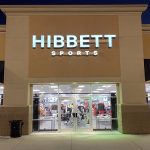The Finish Line’s earnings in its first quarter ended June 1, as expected, dropped sharply due to costs related to the launch of its program to operate athletic shoe departments inside Macy's.
Excluding the charges, both top-line and bottom-line results came in ahead of Wall Street estimates with Finish Line officials citing improving trends in running and continued strength in basketball. Company officials also noted that its just-launched program to operate Finish Line branded shops inside Macy’s is already seeing robust results.
Earnings in the quarter reached $5.1 million, or 10 cents a share, down from $12.3 million, or 24 cents, a year ago. The charge amounting to $8 million, or 10 cents a share, covered startup costs and inventory disposal costs associated with getting the initial Macy's product assortment in place. Key brands in the rollout include Nike, New Balance, Puma, Converse and Skechers.
Excluding the charge, net income decreased 19.1 percent to $9.9 million, or 20 cents a share, better than Wall Street’s consensus estimate of 16 cents. Revenues grew 10.1 percent to $351.1 million, ahead of Wall Street’s average target of $344 million.
For Finish Line, first-quarter comp sales were up 2.4 percent on top of an 8 percent increase a year ago. For the stores, comp sales increased 1.2 percent. Digital comp sales increased 11 percent for the quarter and represented 12.4 percent of total sales, while digital’s operating margins expanded 220 basis points year-over-year.
Store traffic improved to positive low single digits, while digital traffic remained robust, up 35 percent over last year, with mobile accounting for a third of that increase.
“Technology absolutely continues to reshape consumer traffic patterns,” said Glenn Lyon, Finish Line’s chairman and CEO, on a conference call with analysts. “As you have heard me say before, our core customer is a digital native.”
By month, comps were up 1.3 percent in March and ahead 7.7 percent April but slid 1.2 percent in May. June comps to date are down mid single digits,
impacted by the later timing of some key Brand Jordan product launches versus a year ago. With the shift expected to positively impact July and August, Finish Line expects to make up the June weakness in the next two months.
On the category side, footwear comps were up 3.9 percent and the soft goods comp decreased 10.2 percent. Footwear ASPs increased 7 percent.
Running comps were down low single digits, representing an improvement from the trends experienced in the back half of last year due to a strong response to Nike's Flyknit Luna 1, updated versions of Free and Air Max, along with the introduction of Under Armour Spine, according to Lyon. Brooks, Mizuno, and Asics “continue to perform very nicely across both men’s and women’s,” he added.
Running trends improved through Q1, with April and May posting positive comps.
Basketball comps were up 21 percent, with gains across-the-board, led by Jordan, Nike signature products from LeBron and Kevin Durant, as well as retro styles from Reebok, Adidas, and Fila. The strength of basketball contributed to a mid-single-digit comp improvement in men’s.
Women’s, which doesn't benefit from the strength of basketball and has been impacted by the slow start to the sandal season, was down high single digits. Kids paced all segments with a gain in the low-teens, led by Nike, Brand Jordan, Adidas, New Balance and Under Armour.
Soft goods saw a low double-digit decline as gains in Nike and Brand Jordan apparel were offset by declines in other branded apparel and accessories offerings. Soft goods represented 10 percent of total Finish Line business in the quarter. For BTS, the segment is expected to benefit from new apparel programs tied more closely to key footwear introductions, an NCAA T-shirt and shorts program that has tested well; and expanded assortments of backpacks and socks.
The overall 10.1 percent increase was made up of Finish Line sales that rose 4.8 percent; sales associated with Macy's of $13 million; and Running Specialty Group sales that contributed almost $10 million versus prior year of $6 million.
Companywide gross margins decreased 70 basis points to 32.1 percent. Product margin, net of shrink, was down 40 basis points due to higher markdowns.
Consolidated adjusted SG&A expense was down 110 basis points to 27.7 percent of sales, primarily due to the initial ramp-up costs for Macy’s with only partial sales from the program for the quarter.
Regarding some of its newer programs, Lyon said the company is “very pleased” with the initial results of its Macy’s partnership, which went live in 60 Macy locations in the quarter. Strong results were seen for both men’s and women’s, with women’s representing over half the mix.
“This helps validate what we view as one of the most compelling attributes of this partnership, which is access to the predominantly female customer at Macy's, a customer who has not traditionally shopped our Finish Line stores,” said Lyon.
The Finish Line in-store shop program is being led by Mike Marchetti, EVP and GM of the Finish Line Macy's stores, and initial learnings from a branded shop and operational standpoint are being incorporated into further rollouts. In total, 180 branded shops inside Macys are being planned this year. Specific marketing programs are also being set for three key markets for BTS. Finish Line’s related initiative to manage athletic assortments at macys.com is likewise “off to a good start,” said Lyon.
He added, “Bottom line, we're off to a really good start with our Macy's initiative.”
Running Specialty Group grew its number of stores by 11, including the acquisition of the six-door BlueMile running chain in Indianapolis as well as Boulder Running Company.
“We are pleased with our partnership with Gart Capital and the momentum we are seeing in the specialty running business, both in terms of acquisition and greenfield opportunities,” said Lyon. “We have a strong pipeline and are actively engaged in several ongoing discussions with potential acquisition targets.”
Lyon added that Running Specialty Group is well on its way towards its goal of adding 30 new stores through acquisitions and organic openings this fiscal year. The business ended the quarter with 38 specialty running shops in 11 states.
The Finish Line ended the quarter with 651 stores, and still anticipates opening 20 to 25 stores, closing 10 to 15, and remodeling or repositioning 25 to 30.
Regarding its ongoing systems upgrades, installments are on plan with the first focus on improving inventory management. That will be followed by upgrading its merchandising capabilities, increasing fulfillment efficiencies, creating a more scalable platform; and finally, CRM.
At the store level, handhelds will reach Finish Line’s entire store base by the holiday season. The devices are receiving a “great response” from customers and are already being used for more than 30 percent of customer transactions. Winners Circle loyalty sign-up, gift card sales, and inventory search capabilities are also expected to be helped by employee handhelds.
For the fiscal year ending March 1, 2014, the company still expects Finish Line comparable store sales to be up slightly and EPS to increase mid-single digits.
Updating its long-term goals, Finish Line expects to reach $2.2 billion in sales by fiscal 2017, achieved through mid-single-digit growth in its core Finish Line business with digital revenue growing in the low 20 percent range and store revenue increasing low single digits. Macy's is expected to generate revenue of $250 million and Running Specialty Group to contribute $200 million to results by then.














